Mutford and Lothingland, Suffolk
Up to 1834
The Mutford and Lothingland Hundred Incorporation was established by a local Act of Parliament passed on November 15th, 1763. The Incorporation comprised the 24 parishes of Ashby, Barnby, Belton, Blundeston, Bradwell, Burgh Castle, Carlton Colville, Corton, Flixton, Fritton, Gisleham, Gunton, Herringfleet, Hopton, Kessingland, Kirkley, Lound, Lowestoft, Mutford, Oulton, Pakefield, Rushmere, and Somerlyton.
In 1765, the Incorporation erected a House of Industry at Oulton for 300 inmates. The Incorporation borrowed the sum of £5,725 to set up the workhouse. The buildings comprised a chapel, a governor's apartments, various offices, and four large working rooms. The poor were employed in "spinning wool and hemp for cloathing the paupers, and in braiding mackarel and herring nets". The workhouse had its own burial ground situated a litte way to the north of the main buildings.
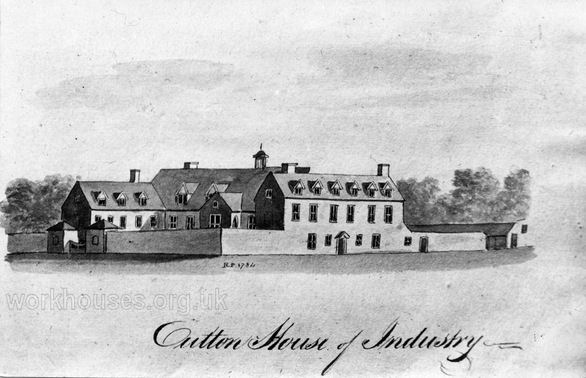
Mutford and Lothingland workhouse from the south-east, c.1784.
A further local Act in 1833 amended and extended the powers of the Incorporation.
The operation of the Incorporation was much commended by the Poor Law Commissioners first annual report in 1835. Its management and economy were much praised, particularly in contrast to some of its neighbouring Incorporations such as Blything whose expenditure was many times greater, as illustrated in the table below showing expenditure on salaries.
| MUTFORD and LOTHINGLAND. 25 Parishes, Pop. 15,255. | BLYTHING. 46 Parishes, Pop. 24,177. | |
| Clerk | £25 | £140 |
| Surgeons | £60 | £700 |
| Assistant Overseers | £180 | £850 |
| Master and Matron | £40 | £100 |
| Treasurer and Foreman | 16 | £0 |
| Schoolmistress, &c. | £5 | £40 |
| TOTAL | £326 | £1830 |
Assistant Poor Law Commissioner Charles Mott, who had responsibility for Suffolk, reported of Mutford and Lothingland:
The directors here follow tip completely the intentions of the act of incorporation, and such precautions are taken as insure the perfect working of the system.
When a vacancy occurs for a director, it is filled tip by ballot at the quarterly meeting. No influence is allowed to prevail; no matter what rank or station he may hold in society, the person to lie chosen must have qualified himself for a director by having first served twelve months as an acting guardian. The appointment of guardian is not merely nominal ; the guardian must have his regular drilling at the weekly meetings. Five are named as a rota, and three must always be present when any business is transacted-one director and two guardians. Non-attendance subjects the directors to a fine of 20s., and the guardians to 10s. ; if three are not present, the whole five are fined, and the fines are strictly enforced. No relief is allowed to paupers on their own application to the board; the application must be made in the presence of the overseer. The overseers are not compelled to pay attention to any application, (except in case of urgent necessity,) unless it is made some tine on or before the day previous to the weekly meeting of guardians ; they are thus enabled to make inquiry into every case, in order to answer any questions the guardians may put to them. If a pauper applies to an overseer, and the overseer neglects to attend the committee to explain the case, the magistrates fine the overseer 5l. under the local Act.
Such overseers as attend are called in one at a time, their separate books of relief are severely scrutinized, and the expenditure of each shilling having undergone the strictest investigation, receives approval by the signatures of the guardians present. These sums, and these sums only, are allowed in their quarterly accounts.
The guardians never allow any pensions or arrears of relief to be paid; it must be allowed and received weekly. No incidental charges are suffered unless sanctioned by the meeting, and approved and certified by the signature of the chairman. Two small bills, amounting together to 10s. 2d., one of them for repairing the wooden leg of one of the paupers of a parish in the hundred, were presented at a meeting which I attended, and after undergoing the customary scrutiny, were ordered to be paid.
Au overseer was severely censured for having passed, on his way to the workhouse, the residence of the employer of a man who was represented as ill, without making inquiry. The relief was disallowed in the officer's accounts until the guardians had proof that the man was ill and required it. If a man is out of employment in any parish of the hundred in which he may reside who belongs to another parish in the hundred, lie is hound to present himself in his own parish to see if he can get employment there. If lie cannot, he obtains a note, from the overseer of the parish to which he belongs, to the overseer of the parish in which he resides, requesting his case may be considered by the Board.
There were 83 applications, from 14 parishes out of the 25. Ten were ordered into the house, not one of whom was expected to accept the offer. Six were rejected and struck out of the overseer's book, and the others, principally persons with large families, amounting, adults and children, to 366 persons, were, after the greatest attention, relieved in trifling sums, the whole amount of the out-door relief for the 14 parishes being only 8l. 14s. 6d., or about 12s. 6d. to each parish for the week. The other 11 parishes (lid not require any out-door relief that week, and it was remarked that even this amount was much larger than their average weekly relief. The surgeon attends the weekly meeting, and is appealed to as to the health of those who are represented as sick. The clerk attends regularly, and keeps the whole affair under one uniform regular system ; indeed, it is impossible to speak too highly of Air. Norton's attention to the interests of the hundred.
After 1834
After 1834, Mutford and Lothingland's local Act status exempted it from many of the provisions of the 1834 Poor Law Amendment Act. Its constituent parishes in 1856 were:
County of Suffolk Ashby, Barnby, Belton, Blundeston, Bradwell, Burgh Castle, Carlton Colville, Corton, Flixton, Fritton, Gisleham, Gorleston with South Town, Gunton, Herringfleet, Hopton, Kessingland, Kirkley, Lound, Lowestoft, Mutford, Oulton, Pakefield, Rushmere, Somerlyton.
The existing Incorporation workhouse continued in operation after 1834. It was extended in 1836, at a cost of £1,100 to improve the classification of inmates. An infirmary was added at the north-east of the workhouse in 1881, followed by an additional infirmary block to its south in 1898. The workhouse location and layout in 1884 and 1994 are shown on the maps below.
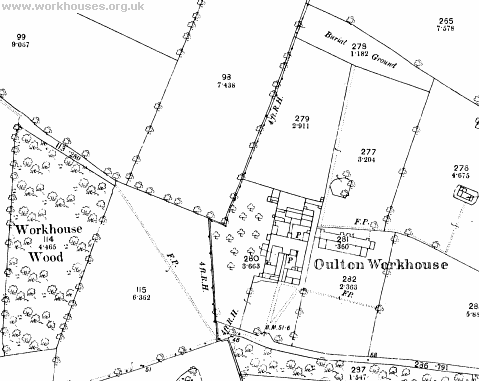
Mutford and Lothingland workhouse site, 1884.
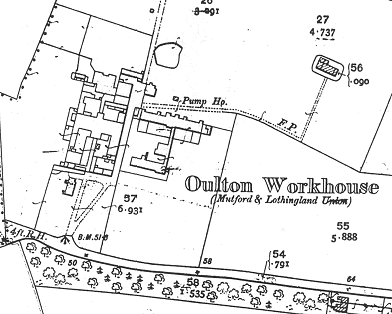
Mutford and Lothingland workhouse site, 1904.
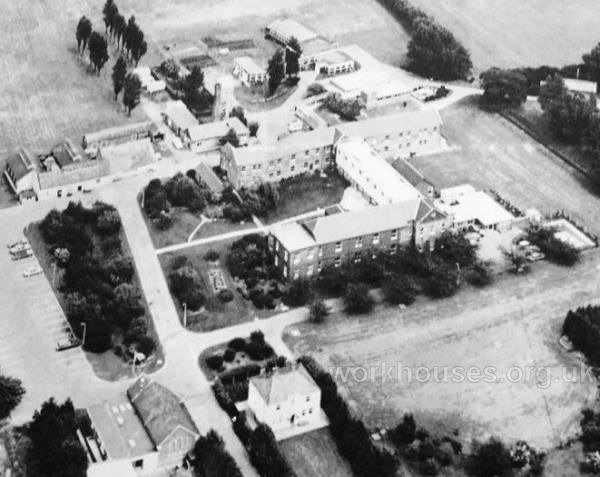
Mutford and Lothingland workhouse aerial view from the south-west.
Courtesy of William Robertson.
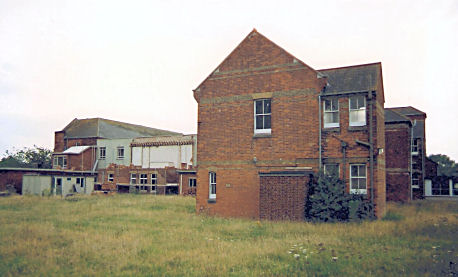
1881 infirmary (foreground) and 1898 infirmary (left) from the north-east, c.1987.
© William Robertson.
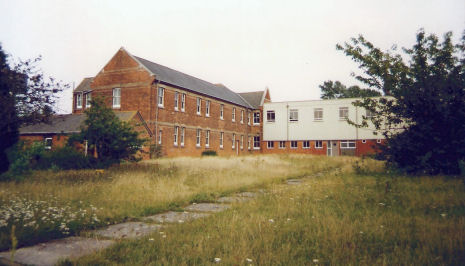
1881 infirmary from the south-west, c.1987.
© William Robertson.
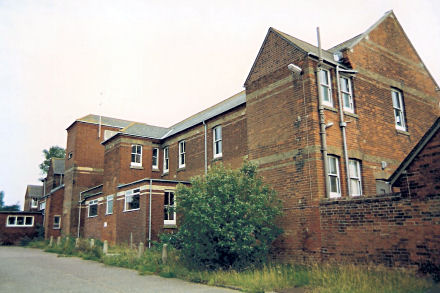
1881 infirmary from the north-west, c.1987.
© William Robertson.
On 15th April, 1891, Gorleston left the Incorporation to join with the parish of Great Yarmouth to form the Great Yarmouth union. Two years later, on 26th March 1893, the Incorporation was dissolved and a Poor Law Union formed in its place with the same member parishes.
In 1926, the medical facilities were extended by the addition of and 18-bed female mental ward and an exetension to the male phthisis (TB) ward. A letter written in November 1926 by DW Boswell (the medical officer?) noted that all female mental cases could now be transferred from the infirmary to the new mental ward. He also suggested that "more barbed wire should be put up around the mental wards, as previously suggested, to prevent the patients from escaping."
After 1930, the former workhouse site became known as Lothingland House, and then as Lothingland Hospital which provided mental health care.
The photo below is thought to have been taken at Lothingland House in 1937 during celebrations for the coronation of George VI. The well-built man at the top right of the photo is the institution's warden Arnold Stafford Read. William Soanes (carpenter/handyman) is standing on the extreme left of the second row from the front. The bearded man seated at the centre of the front row is Major Selwyn Wollaston Humphrey, Mayor of Lowestoft several times between 1920 and 1935.
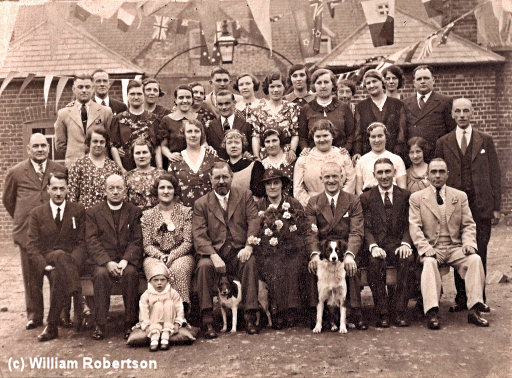
Coronation celebrations at Lothingland House, 1937.
© William Robertson.
The original workhouse building was demolished some time around the early 1960s. The two infirmary blocks remained in use for another thirty years but have now been demolished, with a private residential home for the elderly (Oulton Park Care Centre) recently erected on the site. The former chapel survived until recently as part of an ambulance station, but has now been demolished to make way for new housing.
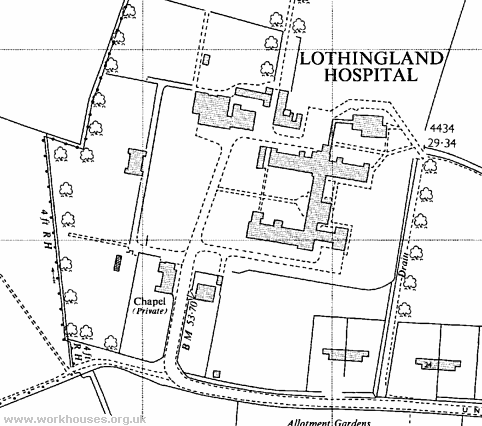
Lothingland Hospital site, 1904.
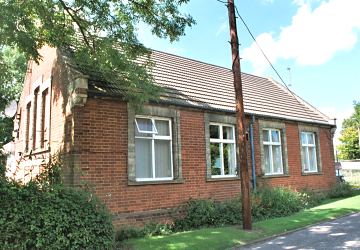
Mutford and Lothingland chapel from the west, 2001.
© Peter Higginbotham.
Children's Homes
By 1912, the union was operating a children's home at 52 Acton Road, Kirkley, in South Lowestoft. By the 1920s, a second home had been opened at Bridge Street, West Lowestoft. Each home could accommodate 12 children.
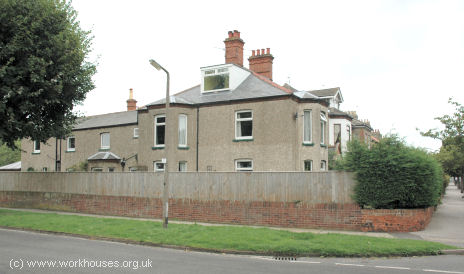
Mutford and Lothingland former children's home at Kirkley, 2006.
© Peter Higginbotham.
Staff
Inmates
Records
Note: many repositories impose a closure period of up to 100 years for records identifying individuals. Before travelling a long distance, always check that the records you want to consult will be available.
- Suffolk Archives, Central Library, Clapham Road South, Lowestoft NR32 1DR. Holdings include: Guardians' minute books (1859-1930); Admissions and discharges (1911-38); Persons in receipt of relief (1902-30); Births, marriages and deaths (1901-31); Lunacy papers (1862-1930); etc.
Bibliography
- Abstract of the Returns from the Governors, Directors etc. of the Several Houses of Industry, and Workhouses, Specially Established for the Relief and Employment of the Poor (1776).
Acknowledgment
- Thanks to Robbie Robertson for contributing the 1784 view and infirmary pictures.
Links
- None.
Unless otherwise indicated, this page () is copyright Peter Higginbotham. Contents may not be reproduced without permission.


